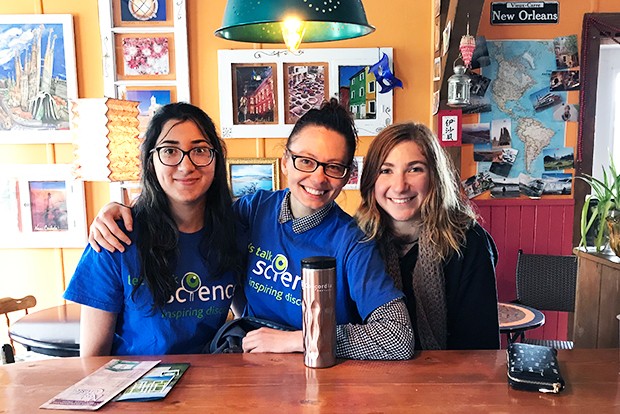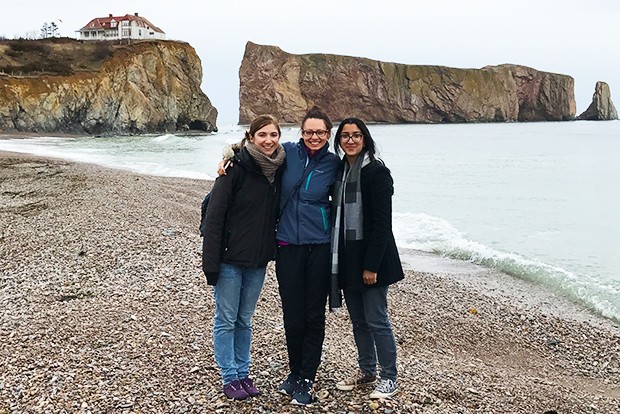3 Concordia volunteers who spread STEM magic
 Let's Talk Science Concordia volunteers Leah Sarah Peer, Yuliya Kondratenko and Astrid de Jaham.
Let's Talk Science Concordia volunteers Leah Sarah Peer, Yuliya Kondratenko and Astrid de Jaham.
How do you inspire the youth to choose careers in STEM?
One way is to mobilize an army of volunteers across the country to get out and show them the infinite awesomeness of science, technology, engineering and mathematics.
Let's Talk Science is a national organization whose strategy is to teach kids of all ages that these academic disciplines are fundamental to their understanding of the world, and can serve as building blocks for exciting careers.
With the help of more than 3,500 post-secondary outreach volunteers, Let's Talk Science provides support for both educators and children in the classroom environment. They facilitate hands-on activities structured around designing experiments and learning about scientific phenomena using basic household items — like blue cabbage juice, for example!
Let's Talk Science works closely with partners across Canada to engage university students pursuing studies in STEM. Volunteers can either deliver these fun activities to kids directly or contribute easily digestible content about their research to CurioCity, one of Let’s Talk Science’s online resources dedicated to helping youth grades 8 to 12 delve deeper into various STEM topics.
From May 15 to 19, Concordia undergraduate students Leah Sarah Peer and Astrid de Jaham, along with alumna and Concordia staff member Yuliya Kondratenko (BA 09, MA 15), took part in a science outreach trip to the Gaspésie region.
1,640 kilometres later, they shared their top reasons for participating.
Make an impact
Kondratenko signed up to for the Quebec Eastern Shores science outreach trip as soon as she got the call-out.
“I have been volunteering for Concordia Let's Talk Science since 2013 and have a couple of rural outreach trips under my belt,” she says.
“This is my first time doing one of such magnitude: six schools in five days — travelling to the towns of New Carlisle, Chandler, New Richmond, Escuminac, Listuguj, and Ste-Jeanne-d’Arc-de-Matane. I immediately felt excited about the possibility of making an impact, even if it's small, on so many kids.”
Do something different
“I felt a bit nervous about doing it at first,” says de Jaham, who’s pursuing a degree in Ecology at Concordia and expects to graduate this spring.
“Our interactions had been mostly via Skype during trip preparation meetings. At the same time, I'm graduating from Concordia this summer and it felt like a perfect time for me to turn over that leaf and do something different.”
Kondratenko agrees.
“We all signed up to do this trip, so as volunteers we already have one thing in common: we share a passion for engaging the youth and using science to explain the world around us,” she says.
Learn teaching skills
Over the course of five days, Kondratenko, De Jaham and Peer worked with 500 kids aged four to 18.
They delivered science workshops on exploring the properties of non-Newtonian liquid. They taught kids about how animals adapt to different habitats. They put problem-solving skills to the test, building a catapult with limited supplies. And they taught the students to distinguish between acidic and basic solutions using blue cabbage juice as an indicator.
“We pretty much stayed together throughout the whole day, and helped each other with delivering all the activities,” says Peer, who’s specializing in Biology with a Minor in Human Rights Studies.
“It was amazing to experience teaching different age groups and different subjects. If you’re considering a career as an educator, this will help you decide whether it’s something you want to pursue.”
 The team (seen here in Percé) visited six different schools in the Gaspésie.
The team (seen here in Percé) visited six different schools in the Gaspésie.
‘A great sense of accomplishment’
Even though they delivered the same activities more than once, the volunteers say the work was anything but repetitive.
“Every time, you needed to adapt your teaching style to a new group of kids or use other ways of explaining it,” Kondratenko says. “You think on the spot, read kids’ body language to see if they’re drifting away and adjust. The challenge made it interesting.”
It’s what de Jaham calls learning in the field.
“After each day, we would brainstorm revisions to our approach, in order to make the activities even more interesting. It gives you a great sense of accomplishment, the fact that you are given this awesome responsibility. You pour your heart into it and you can actually do it.”
Make new friends
Another major perk of volunteering: you get to meet new people and learn about their journey, Peer says.
“Apart from meeting each other, we got to know many educators and locals. We learned about their professional experience and what brought them onto this path."
Kondratenko adds that the group of volunteers clicked instantly. “It felt amazing to work toward a common task with similar-minded people and to become friends in the process.”
Get outside your comfort zone
“Driving through Gaspésie made my eyes sore with beauty,” Kondratenko says.
“At the end of the day, we felt energized enjoying the scenery of the ragged coastline with all of its untainted allure.”
The three volunteers were all grateful for a chance to break up their usual routine with this trip. “Also, it opened our eyes to what day-to-day life is like in Quebec, outside of Montreal,” de Jaham says.
If you’re a Concordia student, sign up to volunteer with Let's Talk Science Concordia. Select Concordia University as your outreach chapter.


